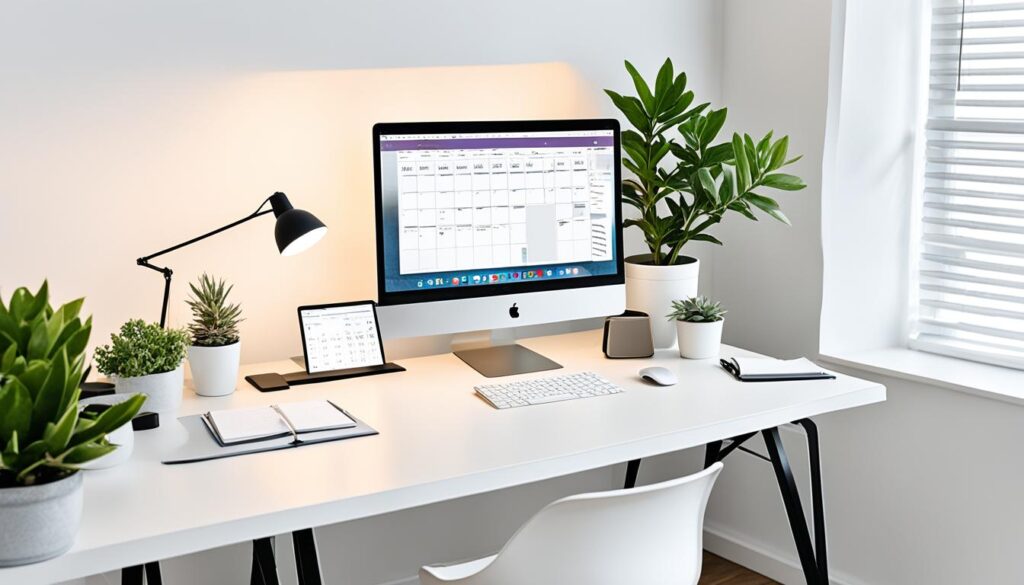How to Stop Procrastinating and Get Work Done Fast
“You may delay, but time will not.” – Benjamin Franklin
Procrastination, the enemy of productivity, has a way of sneaking into our lives and hindering our progress. We often find ourselves putting off tasks, succumbing to distractions, and struggling to complete our work efficiently. But there is hope.
In this article, we will explore powerful strategies and techniques to help you overcome procrastination, increase your motivation, and get work done faster than ever before.
The Psychology of Procrastination
Procrastination is not just a result of laziness or lack of willpower. Various psychological factors contribute to procrastination. Understanding these factors can help in combatting procrastination effectively.
One of the key reasons people procrastinate is due to the fear of failure or perfectionism.
The mindset behind procrastination often involves an irrational belief that if a task is not done perfectly, it is better not to do it at all. This mindset can lead to unnecessary delays and hinder productivity.
Another common reason for procrastination is the tendency to prioritize short-term pleasure over long-term goals. The instant gratification obtained from engaging in activities such as scrolling through social media or watching TV can outweigh the benefits of completing important tasks.
This mindset can result in a lack of motivation and an increase in procrastination.
The impact of procrastination can be detrimental to productivity. It can lead to increased stress and anxiety as deadlines approach, resulting in rushed and subpar work. Procrastination can also create a cycle of dependency on last-minute adrenaline, making it difficult to break the habit and work efficiently.
Gaining insight into the psychology of procrastination is crucial for developing strategies to overcome this behavioral pattern. By recognizing the reasons behind procrastination and the negative impact it can have on productivity, individuals can take proactive steps to change their mindset and increase their motivation to complete tasks efficiently.
In the next sections, we will explore morning routines, time blocking, the Pomodoro Technique, the “Nothing Alternative,” and other effective techniques to help you overcome procrastination, increase your productivity, and achieve your goals.
Morning Routines
The way we start our day can have a significant impact on our productivity. By establishing a morning routine, you can set the right tone for the day and improve your focus and motivation.
Incorporating key activities into your morning routine can promote productivity and reduce the likelihood of procrastination.
One essential component of a successful morning routine is exercise. Engaging in physical activity in the morning not only energizes you but also boosts your mood and mental clarity.
Whether it’s going for a run, doing yoga, or simply taking a brisk walk, incorporating exercise into your morning routine can help you start the day on a positive note.
Another beneficial activity to include in your morning routine is meditation. Taking a few moments to practice mindfulness and set intentions for the day can help calm your mind and increase your focus.
Whether you prefer guided meditation or simply sitting in silence, carving out time for meditation can have a profound impact on your overall well-being and productivity.
Goal setting is yet another important aspect of a morning routine. By setting clear goals for the day, you provide yourself with direction and purpose. Write down your goals or create a to-do list to stay organized and focused throughout the day. This practice not only helps prioritize your tasks but also enables you to track your progress and celebrate your accomplishments.
Avoiding distractions in the morning is crucial for maintaining productivity. Consider establishing boundaries with technology by refraining from checking emails or social media until a designated time. This will help you avoid getting caught up in non-essential tasks and stay focused on what truly matters.
By incorporating exercise, meditation, goal setting, and minimizing distractions into your morning routine, you can set the tone for a productive day ahead. Experiment with different activities and find a routine that best suits your needs and preferences. Remember, starting the day right is the first step towards overcoming procrastination and maximizing your productivity.

Time Blocking and the Pomodoro Technique
Effective time management is essential in boosting productivity and overcoming procrastination. In this section, we will explore two powerful techniques: time blocking and the Pomodoro Technique.
Time Blocking: Time blocking involves scheduling specific time blocks for different tasks. By dividing your day into defined periods focused on specific activities, you can enhance concentration and reduce distractions.
Time blocking helps you prioritize your tasks and ensures that you allocate dedicated time for each task, eliminating the temptation to procrastinate. By following a structured schedule, you can make the most of your workday and achieve greater productivity.
The Pomodoro Technique: The Pomodoro Technique is a time management strategy that involves working in short bursts of intense focus, followed by short breaks.
This technique helps you maintain focus by breaking your work into manageable intervals. It is typically structured as 25 minutes of focused work, called a “Pomodoro,” followed by a short 5-minute break. After completing four Pomodoros, you can take a longer break. By working in these concentrated intervals, you can enhance productivity and stay motivated.
To implement these techniques effectively, start by identifying your most important tasks and allocating specific time blocks for each. Use a timer or a productivity app to track your Pomodoros and breaks. Experiment with different durations for your Pomodoros and breaks to find what works best for you.
Remember to eliminate distractions during your work sessions, such as turning off notifications or finding a quiet space to work. By incorporating time blocking and the Pomodoro Technique into your routine, you can optimize your time, increase productivity, and overcome procrastination.

The Power of the “Nothing Alternative”
The “Nothing Alternative” is a powerful strategy for overcoming procrastination and increasing productivity. By eliminating distractions and focusing solely on the task at hand, you can avoid the common pitfalls of procrastination and achieve your goals more efficiently.
To implement the “Nothing Alternative,” start by identifying the specific distractions that tend to derail your focus. These distractions could include social media, email notifications, or other non-essential tasks. Once you have identified these distractions, commit to eliminating them during your dedicated work periods.
One effective way to implement the “Nothing Alternative” is to create a distraction-free work zone.
Remove any items that may divert your attention and create an environment that is conducive to focus.

In addition to removing distractions, it’s important to adopt motivational strategies to stay focused and motivated. Find techniques that work for you, such as setting small goals and rewarding yourself when you accomplish them.
You can also create a positive and inspiring work environment by surrounding yourself with motivational quotes or images.
Remember that eliminating procrastination requires discipline and commitment. Stay accountable to yourself and track your progress. When you find yourself tempted to indulge in distractions, remind yourself of the “Nothing Alternative” and the productive alternatives that await you if you stay focused.
By implementing the “Nothing Alternative” and combining it with other motivational strategies, you can eliminate procrastination, avoid distractions, and increase your productivity. Stay committed to your goals and enjoy the sense of accomplishment that comes from completing tasks efficiently.
Setting Up for Distraction-Free Work
Distractions can significantly hinder productivity and contribute to procrastination. To create a distraction-free work environment, there are several strategies you can implement:
- Organize Your Workspace: A cluttered workspace can be distracting and make it difficult to focus. Take the time to declutter and organize your desk, ensuring that everything has its designated space.
- Minimize External Distractions: Identify and minimize distractions in your environment. This can include turning off notifications on your phone, closing unnecessary tabs on your computer, or using noise-canceling headphones to block out background noise.
- Set Boundaries with Technology: Establish boundaries with technology to avoid falling into the trap of constant distractions. Consider setting specific times to check emails or browse social media, and use productivity apps or browser extensions that limit access to distracting websites during work hours.
By reducing distractions and optimizing your workspace, you can create an environment that promotes focus, minimizes interruptions, and enables you to accomplish tasks efficiently.

Overcome Procrastination by Planning Your Day the Night Before
Planning your day the night before can greatly contribute to overcoming procrastination and increasing productivity. By organizing your tasks, determining your most important priorities, and creating a clear schedule, you can start your day with a sense of direction and purpose.
Effective scheduling begins with setting priorities. Take the time to identify the most crucial tasks that need to be accomplished and prioritize them accordingly. By focusing on these essential tasks, you can ensure that you make progress on your most important goals.
Task organization is key to effective planning. Break down larger tasks into smaller, more manageable steps. This makes them less overwhelming and easier to tackle. Use lists or a task management tool to keep track of your tasks and deadlines. This way, you can stay organized and ensure that important tasks are not overlooked.
As part of your night routine, take a few minutes to create a clear schedule for the next day. Allocate specific time blocks for different tasks, ensuring that you have dedicated time for both important and urgent tasks. Avoid overloading your schedule and allow for some flexibility to accommodate unexpected events.
By planning your day the night before, you set yourself up for a productive and focused day. When you wake up, you know exactly what needs to be done and can start working without wasting time on decision-making. This proactive approach helps minimize the risk of procrastination and keeps you on track throughout the day.
How Positive Reinforcement Can Help You Complete Tasks Efficiently
Positive reinforcement is a powerful tool that can help you overcome procrastination and increase motivation. By implementing a reward system and providing positive feedback, you can effectively complete tasks and boost your productivity. Recognizing and celebrating your achievements will help you maintain your motivation and enhance your overall performance.
To incorporate positive reinforcement techniques into your daily routine, consider the following tips:
- Set achievable goals: Break down your tasks into smaller, more manageable goals. Each time you complete a goal, reward yourself to reinforce positive behavior and encourage task completion.
- Choose meaningful rewards: Select rewards that are meaningful to you and align with your values and interests. This will further motivate you to complete tasks efficiently and enjoy the rewards of your hard work.
- Provide self-affirmations: Remind yourself of your capabilities and strengths. Use positive self-talk to boost your confidence and reinforce a positive mindset, driving you to complete tasks with enthusiasm and determination.
- Celebrate progress: Acknowledge and celebrate your progress, not just the end result. This will keep you motivated and engaged in the task, making it more likely for you to complete it efficiently.
By incorporating positive reinforcement techniques into your daily routine, you can overcome procrastination, stay motivated, and accomplish tasks efficiently. Celebrating your achievements and rewarding yourself for your hard work will not only boost your productivity but also contribute to a positive mindset and overall well-being.

Conclusion
In conclusion, overcoming procrastination is essential for increasing productivity and achieving your goals. By understanding the psychology behind procrastination and implementing effective strategies, you can unlock your full potential and complete tasks efficiently.







